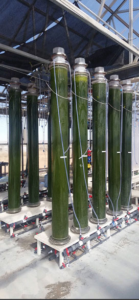This month ABO welcomes Arizona Algae Products, a company producing sustainable protein powders and omega-3 oils from algae for use in food, dietary supplements and wellness products, as one of our newest Bronze-level members. The Bronze-level ABO membership was designed for startups with potential to make big impacts in the industry, and Arizona Algae fits that description perfectly.
 Arizona Algae’s technology is centered around cutting-edge bioreactors and enclosed raceway ponds that grow natural, photosynthetic algae that are processed into a variety of non-GMO, non-allergenic products. The controlled environment means Arizona Algae’s products can be very consistent and meet the highest quality standards for the most discerning applications.
Arizona Algae’s technology is centered around cutting-edge bioreactors and enclosed raceway ponds that grow natural, photosynthetic algae that are processed into a variety of non-GMO, non-allergenic products. The controlled environment means Arizona Algae’s products can be very consistent and meet the highest quality standards for the most discerning applications.
The company is currently growing and harvesting algae in greenhouses with a production area of over 60,000 square feet, high atop the Colorado Plateau near Holbrook, Arizona. All growing operations take place under USDA-GAP (“Good Agricultural Practices”) and all downstream processing conforms to cGMP standards.
The company’s location may seem remote, but it illustrates the great potential of algae cultivation, and the jobs that can come with it, to thrive in places where traditional agriculture would not. At 5,500 feet of elevation, little rain, and brackish groundwater the site is fairly inhospitable for growing traditional crops, but those are perfect conditions for Arizona Algae’s photobioreactors and saltwater-loving strains of algae.
Some of the company’s products include:
- EPA15+ Algal Oil Extract, a full-spectrum, food-grade oil extract.
- DEPRO50+ Defatted Algae Protein plus Omega 3 Powder, an excellent source of non-animal protein, containing a minimum of 50% protein with a complete amino-acid profile, carotenoids, and residual levels of omega 3 EPA.
- WPRO30+ Whole Algae Protein plus Omega 3 Powder, also an excellent source of non animal protein, containing all essential amino acids plus EPA omega 3.
These products have a number of specialty applications in multi-billion dollar markets, but they also have everyday uses. The company’s website includes recipes for algae bread, noodles, crackers and gyoza.
Sustainability is one of the defining characteristics of the Arizona Algae process, and the company’s overarching mission to its customers and partners. The company incorporates environmental stewardship into its own operations, in addition to providing a line of ingredients that can help improve the sustainability profiles of their customer’s own supply chains.
Learn more at https://www.azalgae.com
Welcome Arizona Algae!

